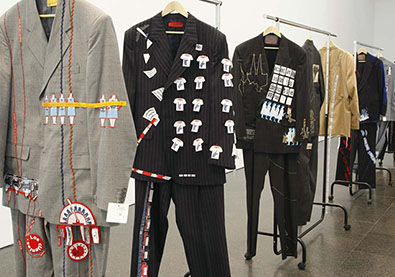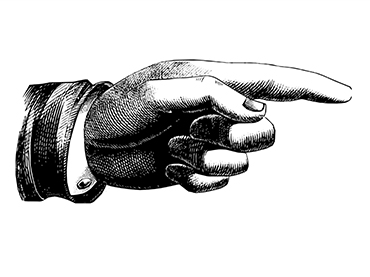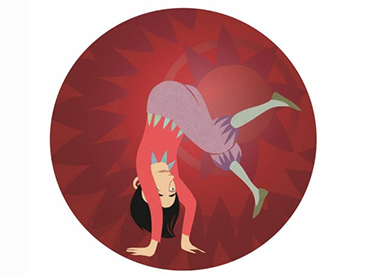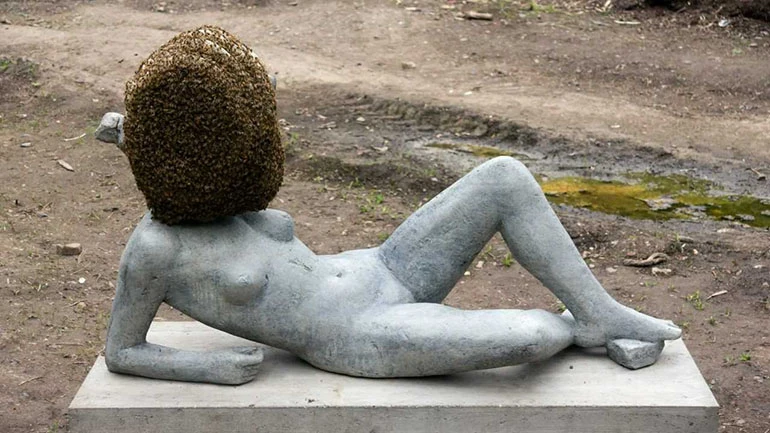-
Wednesday, 17 January – 7pm / Sabatini Building, Auditorium
Carmen Bernárdez
Does Materiality Stick? New Conceptions and Uses of Matter in Artistic Practices
Presented by: Rocío Robles (Complutense Universities of Madrid)
From the latter half of the twentieth century onwards, the material factor in artistic creation has not received the attention it merits, in all likelihood because it is deemed routine and irksome. Setting out from the analysis and study of specific works, for instance Dieter Roth’s Sea of Chocolate and The Brukman Workers. 8 Suits with Two Parallel Stories, by Alice Creischer and Andreas Siekmann, this lecture will explore material culture, and the polysemy of materials and their political and sociological capacity, in greater depth.

-
Wednesday, 9 May 2018 – 7pm / Nouvel Building, Auditorium 200 Edificio Nouvel, Auditorio 200
Diana Taylor
Dead Capital
Presented by: Juan Albarrán (the Autonomous University of Madrid)
Bom Retiro 958 metros is a performance piece by Brazilian company Teatro da Vertigem which takes us on a walk around São Paulo and its phantasmagorical world of things: objects of consumerism — some still in use, some in disuse, and others directly in different states of disintegration. This experiential work challenges many of our assumptions about the wish to accumulate, transform, archive and collect “things” as we move through the darkest corners of an immigrant neighbourhood. Moreover, the lecture approaches performance as a ritual moving towards disappearance. What circulates? What remains? And, ultimately, what do we presume fades away from culture?

-
Wednesday, 16 May – 7pm / Nouvel Building, Auditorium 200 Edificio Nouvel, Auditorio 200
Carlos Fernández-Pello
Touch without Touching. A Detour Around the Intangible Islands of the Index Finger
Presented by: Chema González (Museo Reina Sofía)
This lecture sets forth a long journey which is based on evocative and elusive references, contributing to an understanding of the way in which the seduction of materiality, the object, encyclopaedic and disconnected discourses, stemming from the Internet, surfaces in contemporary art practices. On Misima Island the inhabitants unite and transform language through their relationship with the material environment, and representations of the index finger in Western culture —pointing, determining, explaining, highlighting — are mixed together as a hermetic and appealing symptom.

-
Wednesday, 23 May – 7pm / Sabatini Building, Auditorium Edificio Sabatini, Auditorio
Jesús Vega
Entangled with Things: Contemporary Experiences of Materiality
Presented by: Olga Fernández (the Autonomous University of Madrid)
Things have gone by and go unnoticed. Therein lies their strength, their binding nature, their reality in cultural terms. Yet cultural theory continues to show its fear of things and their materiality, or its contempt and neglect. Becoming entangled with them propels us towards derealisation and objectification, depending on how this fear is expressed. Conversely, what if there were solid, inescapable links which shape our cognitive, practical and expressive experiences? This lecture seeks to explore different ways of understanding experiences prompted by the way in which we become entangled with the materiality of things. Far from hastily declaring the end of things, this, therefore, points to how we should perhaps acknowledge their profound influence and proximity and re-examine our experience of materiality.

-
Monday, 11 June – 7pm / Nouvel Building, Auditorium 200 Edificio Nouvel, Auditorio 200
Michael Taussig
The Alpha and Omega of Mastery. When Things Speak to Things
Presented by: Chema González (Museo Reina Sofía)
This session — part academic lecture, part performance lecture — reflects on Walter Benjamin’s story of Rastelli Raconte, a celebrated juggler who is invited by the regent of Constantinople to publicly demonstrate the skill which has brought him his fame: controlling a ball which seems to move on its own and only responds to Rastelli. Via this tale, Taussig seeks to explore the relationship that exists between the place occupied by secrets in our culture and the enigmatic knowledge of bodies that seem to communicate.

New Materialisms

Held on 11 Jun 2018
This series of lectures reflects on the new forms of materiality underlying contemporaneity. The art of recent decades has been shaped by its taking the processes of dematerialisation described by Lucy Lippard in the late 1960s to the extreme; namely, the now off-centre position of the object, the development of project-based practices, the changes to the status of art work and the displacement of the concept of authorship. This setting has been questioned by new paradigms which lay out new relationships between the object, experience and the body. Thus, the return to materiality opposes the virtual hegemony of today’s digital society, whereby cultural and economic spheres have been subsumed under identical immaterial dynamics of production and consumerism.
Therefore, the series encompasses ideas for debate, from disciplines such as art history, performance studies, anthropology and the philosophy of science. It sets out to contemplate how the transformations of materiality have impacted on the modes of collecting, archiving and exhibiting objects; how the limits between inert objects and living bodies from a post-humanist perspective have become indistinct with regard to the forms of creative work that have become commonplace in the post-industrial world; and the disruptive potential of magic and ritual in the face of technocratic logic, as well as the mounting interest in the physicality of cultural artefacts. This displacement must not be interpreted as a shift towards formalism, but rather a symptom of the need to analyse current artistic practices from the dynamics governing a new historical period.
Framework
The 10th Anniversary of the MA in Contemporary Art History and Visual Culture
Organised by
Museo Reina Sofía and the MA in Contemporary Art History and Visual Culture (the Autonomous and Complutense Universities of Madrid)
Participants
Carmen Bernárdez is an art historian and professor in the Contemporary Art Department at the Complutense University of Madrid. Her international academic studies in two traditionally opposing disciplines — art history and restoration — outline a research arc focused on the technique of the artwork understood as a cultural process. Drawing from these directives, she has written essays, edited catalogues and curated exhibitions on avant-garde artists across history, such as Ángel Ferrant, Pablo Gargallo, María Blanchard and Pablo Picasso, and has published the books Historia del arte. Primeras vanguardias (Planeta, 1994), Joseph Beuys (Nerea, 1999) and María Blanchard (Fundación Mapfre 2009), as well as contributing to a broad number of collective publications.
Carlos Fernández-Pello. Is an artist, designer and professor at IED Madrid. He combines his artistic practice with curating, audiovisual production, writing and DIY, and, through the object, his work focuses on a broad range of speculative and epistemological interests. He is the author of Saber Parcial/Sabor diagonal: imágenes del texto y producción de conocimiento desde el arte (the Complutense University of Madrid 2017), and designed, in addition to other strands of mainstream culture, the cover of Ídolo, an album by C. Tangana (2017, Sony Music). He has also curated Flowers; Abyss; Parataxis (La Casa Encendida, 2012) and, with Beatriz Alonso, is currently putting together an exhibition on the synchrony and eccentricity of artistic production in Madrid under the title Querer parecer noche (Wanting to Seem Like Night, Centro de Arte 2 de Mayo, 2018).
Michael Taussig is a social anthropologist and professor at Columbia University. He is the author of a broad number of essays, including The Devil and Commodity Fetishism in South America (The University of North Carolina Press, 1990), in which he explores how indigenism dismantles capitalist exchange; Shamanism, Colonialism, and the Wild Man: A Study in Terror and Healing (University of Chicago Press, 1991), an essay on the fictions of death during colonial terror in Latin America; and Magic of the State (Routledge,1997), on how the modern colonial state operates through principles of power and abstraction akin to magic. His work is key to understanding a material sense of the object which differs from the fetishist sense and that of the value of traditional change.
Diana Taylor is an art critic, theorist and professor of Performance Studies at NYU (New York University), as well as the director of the Hemispheric Institute of Performance and Politics. She is the author of the book Performance (Duke University Press, 2016), which explores the expanded use of the term, not only on an artistic level, but also economically, sexually and politically, with a view to conceiving of performance as an act which is inseparable from the manifestations of power, memory and identity. Moreover, she has studied the relationships between civil society, trauma and performance practices in Disappearing Acts: Spectacles of Gender and Nationalism in Argentina's 'Dirty War' (Duke University Press, 1997) and The Archive and the Repertoire: Performing Cultural Memory in the Americas (Duke University Press, 2003).
Jesús Vega is a philosopher of science and lecturer of Philosophy at the Autonomous University of Madrid. His work is based on an analysis of the epistemology of technique and perceptive experience. From the sphere of the so-called post-humanities, he has analysed the modes of knowledge production and awareness of the object. He is also the author of Los saberes de Odiseo. Una filosofía de la técnica (Eudeba, 2009), and a broad range of articles and contributions in collective books on the philosophy of science and technology.
Más actividades

Institutional Decentralisation
Thursday, 21 May 2026 – 5:30pm
This series is organised by equipoMotor, a group of teenagers, young people and older people who have participated in the Museo Reina Sofía’s previous community education projects, and is structured around four themed blocks that pivot on the monstrous.
This fourth and final session centres on films that take the museum away from its axis and make it gaze from the edges. Pieces that work with that which is normally left out: peripheral territories, unpolished aesthetics, clumsy gestures full of intent. Instead of possessing an institutional lustre, here they are rough, precarious and strange in appearance, legitimate forms of making and showing culture. The idea is to think about what happens when central authority is displaced, when the ugly and the uncomfortable are not hidden, when they are recognised as part of the commons. Film that does not seek to be to one’s liking, but to open space and allow other ways of seeing and inhabiting the museum to enter stage.
![Tracey Rose, The Black Sun Black Star and Moon [La luna estrella negro y negro sol], 2014.](https://recursos.museoreinasofia.es/styles/small_landscape/public/Obra/AD07091_2.jpg.webp)
On Black Study: Towards a Black Poethics of Contamination
Monday 27, Tuesday 28 and Wednesday 29 of April, 2026 – 16:00 h
The seminar On Black Study: Towards a Black Poethics of Contamination proposes Black Study as a critical and methodological practice that has emerged in and against racial capitalism, colonial modernity and institutional capture. Framed through what the invited researcher and practitioner Ishy Pryce-Parchment terms a Black poethics of contamination, the seminar considers what it might mean to think Blackness (and therefore Black Study) as contagious, diffuse and spreadable matter. To do so, it enacts a constellation of diasporic methodologies and black aesthetic practices that harbor “contamination” -ideas that travel through texts, geographies, bodies and histories- as a method and as a condition.
If Blackness enters Western modernity from the position of the Middle Passage and its afterlives, it also names a condition from which alternative modes of being, knowing and relating are continually forged. From within this errant boundarylessness, Black creative-intellectual practice unfolds as what might be called a history of touches: transmissions, residues and socialities that unsettle the fantasy of pure or self-contained knowledge.
Situated within Black radical aesthetics, Black feminist theory and diasporic poetics, the seminar traces a genealogy of Black Study not as an object of analysis but as methodological propositions that continue to shape contemporary aesthetic and political life. Against mastery as the horizon of study, the group shifts attention from what we know to how we know. It foregrounds creative Black methodological practices—fahima ife’s anindex (via Fred Moten), Katherine McKittrick’s expansive use of the footnote, citation as relational and loving labour, the aesthetics of Black miscellanea, and Christina Sharpe’s practices of annotation—as procedures that disorganise dominant regimes of knowledge. In this sense, Black Study is approached not as a discrete academic field but as a feel for knowing and knowledge: a constellation of insurgent practices—reading, gathering, listening, annotating, refusing, world-making—that operate both within and beyond the university.
The study sessions propose to experiment with form in order to embrace how ‘black people have always used interdisciplinary methodologies to explain, explore, and story the world.’ Through engagements with thinkers and practitioners such as Katherine McKittrick, C.L.R. James, Sylvia Wynter, Christina Sharpe, Fred Moten, Tina Campt, Hilton Als, John Akomfrah, fahima ife and Dionne Brand, we ask: What might it mean to study together, incompletely and without recourse to individuation? How might aesthetic practice function as a poethical intervention in the ongoing work of what Sylvia Wynter calls the practice of doing humanness?

Intergenerationality
Thursday, 9 April 2026 – 5:30pm
This series is organised by equipoMotor, a group of teenagers, young people and older people who have participated in the Museo Reina Sofía’s previous community education projects, and is structured around four themed blocks that pivot on the monstrous.
The third session gazes at film as a place from which to dismantle the idea of one sole history and one sole time. From a decolonial and queer perspective, it explores films which break the straight line of past-present-future, which mix memories, slow progress and leave space for rhythms which customarily make no room for official accounts. Here the images open cracks through which bodies, voices and affects appear, disrupting archive and questioning who narrates, and from where and for whom. The proposal is at once simple and ambitious: use film to imagine other modes of remembering, belonging and projecting futures we have not yet been able to live.

Remedios Zafra
Thursday March 19, 2026 - 19:00 h
The José Luis Brea Chair, dedicated to reflecting on the image and the epistemology of visuality in contemporary culture, opens its program with an inaugural lecture by essayist and thinker Remedios Zafra.
“That the contemporary antifeminist upsurge is constructed as an anti-intellectual drive is no coincidence; the two feed into one another. To advance a reactionary discourse that defends inequality, it is necessary to challenge gender studies and gender-equality policies, but also to devalue the very foundations of knowledge in which these have been most intensely developed over recent decades—while also undermining their institutional support: universities, art and research centers, and academic culture.
Feminism has been deeply linked to the affirmation of the most committed humanist thought. Periods of enlightenment and moments of transition toward more just social forms—sustained by education—have been when feminist demands have emerged most strongly. Awareness and achievements in equality increase when education plays a leading social role; thus, devaluing intellectual work also contributes to harming feminism, and vice versa, insofar as the bond between knowledge and feminism is not only conceptual and historical, but also intimate and political.
Today, antifeminism is used globally as the symbolic adhesive of far-right movements, in parallel with the devaluation of forms of knowledge emerging from the university and from science—mistreated by hoaxes and disinformation on social networks and through the spectacularization of life mediated by screens. These are consequences bound up with the primacy of a scopic value that for some time has been denigrating thought and positioning what is most seen as what is most valuable within the normalized mediation of technology. This inertia coexists with techno-libertarian proclamations that reactivate a patriarchy that uses the resentment of many men as a seductive and cohesive force to preserve and inflame privileges in the new world as techno-scenario.
This lecture will address this epochal context, delving into the synchronicity of these upsurges through an additional parallel between forms of patriarchal domination and techno-labor domination. A parallel in which feminism and intellectual work are both being harmed, while also sending signals that in both lie emancipatory responses to today’s reactionary turns and the neutralization of critique. This consonance would also speak to how the perverse patriarchal basis that turns women into sustainers of their own subordination finds its equivalent in the encouraged self-exploitation of cultural workers; in the legitimation of affective capital and symbolic capital as sufficient forms of payment; in the blurring of boundaries between life and work and in domestic isolation; or in the pressure to please and comply as an extended patriarchal form—today linked to the feigned enthusiasm of precarious workers, but also to technological adulation. In response to possible resistance and intellectual action, patriarchy has associated feminists with a future foretold as unhappy for them, equating “thought and consciousness” with unhappiness—where these have in fact been (and continue to be) levers of autonomy and emancipation.”
— Remedios Zafra

ARCO2045. The Future, for Now
Saturday 7, March 2026 - 9:30pm
The future, its unstable and subjective nature, and its possible scenarios are the conceptual focus of ARCOmadrid 2026. A vision of the future linked to recent memory, a flash of insight into a double-edged sword. This year's edition, as in the previous two, will once again hold its closing party at the Reina Sofia Museum. This time, the star of the show is Carles Congost (Olot, Girona, 1970), one of the artists featured in the new presentation of the Collections recently inaugurated on the 4th floor of the Sabatini Building.
Carles Congost, with his ironic and timeless gaze, is responsible for setting the tone for this imperfect future, with a DJ session accompanied by some of his works in the Cloister on the first floor of the Sabatini Building of the Museo on the night of Saturday 7 March.